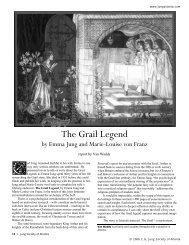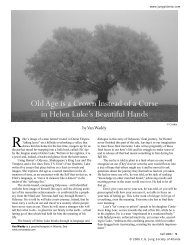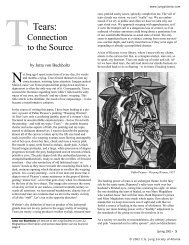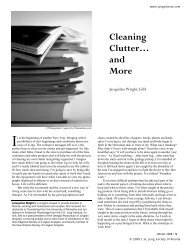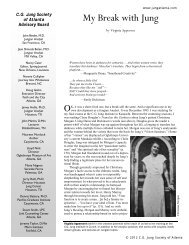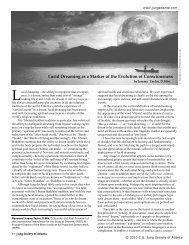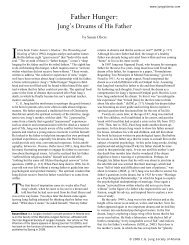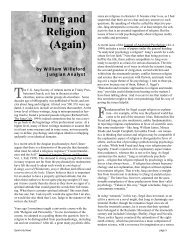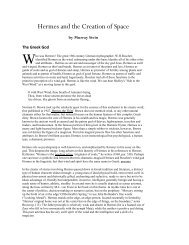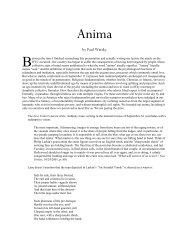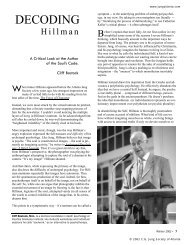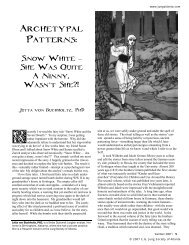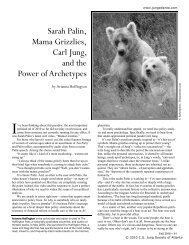Bittersweet Eros - C.G. Jung Society of Atlanta
Bittersweet Eros - C.G. Jung Society of Atlanta
Bittersweet Eros - C.G. Jung Society of Atlanta
Create successful ePaper yourself
Turn your PDF publications into a flip-book with our unique Google optimized e-Paper software.
<strong>Bittersweet</strong><br />
My name is Love, supreme my sway.<br />
The greatest god and greatest pain,<br />
Air, earth, and seas, my power obey,<br />
And gods themselves must drag my chain.<br />
In every heart my throne I keep,<br />
Fear ne’er could daunt my daring soul;<br />
I fire the bosom <strong>of</strong> the deep,<br />
And the pr<strong>of</strong>oundest hell control.<br />
—Miquel de Cervantes, Don Quixote, Part II, Chap XX<br />
I have become increasingly aware that most <strong>of</strong> the people<br />
who walk into my consulting room for therapy do so because<br />
<strong>of</strong> difficulties in loving and being loved. The problem<br />
appears dressed in many guises such as an absence <strong>of</strong> love, an<br />
impossible or humiliating love, an unrequited or lost love, an<br />
impossible triangle, or an addiction to love, to name a few. I see<br />
the same difficulty reflected in modern society, in a general<br />
lack <strong>of</strong> connection and relatedness. Yet one glance at the books<br />
and magazines in our bookstores reveal our obsession with the<br />
topic <strong>of</strong> love. We are told how to find love, how to keep love,<br />
whom to love and when to love. We bemoan its absence, complain<br />
about its quality and suffer from its power over us. It fascinates<br />
and captivates us, yet seems to bring our greatest pain.<br />
The word love and <strong>Eros</strong> are <strong>of</strong>ten used interchangeably.<br />
Unfortunately, the word love has become both loaded and demeaned<br />
through use. <strong>Eros</strong> is an even more abstract term for<br />
most people and we see a similar degeneration in its representation.<br />
I believe that a closer look at the god <strong>Eros</strong> may provide<br />
some illumination and understanding about why we experience<br />
so much suffering with love.<br />
Called “the first-born and fairest <strong>of</strong> the gods,” <strong>Eros</strong> personifies<br />
desire and the force that brings things together. There<br />
are actually two Greek myths about <strong>Eros</strong>. Hesiod, in his Theogony,<br />
tells us that <strong>Eros</strong> arose out <strong>of</strong> Chaos. He describes him as<br />
being that love which s<strong>of</strong>tens the heart and whose fructifying<br />
Jacqueline Wright, Ed.D., will be our speaker in November. See<br />
program description on page 2 for complete biography.<br />
4 • <strong>Jung</strong> <strong>Society</strong> <strong>of</strong> <strong>Atlanta</strong><br />
<strong>Eros</strong><br />
by Jacqueline Wright<br />
www.jungatlanta.com<br />
Etienne Maurice-Falconet, Cupid, 1757<br />
influence would henceforth preside over the formation <strong>of</strong> beings<br />
and things. Later myths claim that <strong>Eros</strong> was born from the<br />
union <strong>of</strong> Aphrodite and Ares, the goddess <strong>of</strong> beauty and love<br />
and the god <strong>of</strong> war. <strong>Eros</strong> was represented as an undisciplined<br />
and mischievous child who created havoc with his arrows. He<br />
did not grow as other children did, and Aphrodite, out <strong>of</strong> her<br />
concern for his health and growth, consulted the oracle Themis.<br />
The oracle replied that love couldn’t grow without passion. The<br />
answer to the problem came to Aphrodite through the birth <strong>of</strong><br />
another son, Anteros. His name means “answering love” and he<br />
is known as the god <strong>of</strong> passion. The story goes that <strong>Eros</strong> would<br />
start relationships and then Anteros would initiate a dialogue<br />
that permitted the relationship to continue on a deeper level.<br />
When Anteros was with his brother, love grew and flourished,<br />
but when he was separated from him, <strong>Eros</strong> returned to his mischievous<br />
habits.<br />
This great god <strong>of</strong> primordial energy and desire has evolved<br />
over time into the cherubic, insipid figure <strong>of</strong> Cupid, whose image<br />
appears on greeting cards, in trite logos and sappy depictions<br />
<strong>of</strong> love. In our modern society, <strong>Eros</strong> remains a winged<br />
child who causes people to fall in love by penetration <strong>of</strong> his<br />
arrows and for the most part, he is not even recognized as a<br />
god. Originally identified with creative power, he has been reduced<br />
to the merely erotic and is now associated with gratification<br />
and sexuality. We are reminded here <strong>of</strong> <strong>Jung</strong>’s characterization<br />
<strong>of</strong> neurosis as a god who has been wounded. <strong>Jung</strong><br />
viewed the gods as dramatizations <strong>of</strong> particular archetypal energies<br />
and recognized that it was man’s estrangement from the<br />
gods within that caused considerable suffering.<br />
<strong>Jung</strong> considered <strong>Eros</strong> the “principle <strong>of</strong> relationship,” the<br />
capacity to form relationships based on love and desire. In his<br />
© 2004 C.G. <strong>Jung</strong> <strong>Society</strong> <strong>of</strong> <strong>Atlanta</strong>
acknowledgment <strong>of</strong> <strong>Eros</strong> in a last passage <strong>of</strong> his biography at<br />
the end <strong>of</strong> his life he says: “<strong>Eros</strong> is a kosmogonos, a creator<br />
and father-mother <strong>of</strong> all higher consciousness… it might well<br />
be the first condition <strong>of</strong> all cognition and the quintessence <strong>of</strong><br />
divinity itself. …A man is at its mercy. He may assent to it, or<br />
rebel against it; but he is always caught up by it and enclosed<br />
within it.” (CW 16:444)<br />
<strong>Eros</strong> has a destructive as well as creative power and can be<br />
both cruel as well as tender. Sappho, the ancient Greek poet<br />
who infused her works with intense emotions, was the first to<br />
call <strong>Eros</strong> “bittersweet”, describing him as charming and very<br />
beautiful, yet cruel to his victims. Many lovers might heartily<br />
echo and validate such sentiments. The convergence <strong>of</strong> <strong>Eros</strong>,<br />
which <strong>of</strong>ten comes with great intensity, creates contradiction<br />
and paradox because it brings both pleasure and pain. That is<br />
why it has been written: “… the Love-god, golden-haired,<br />
stretches his charmed bow with twin arrows, and one is aimed<br />
at happiness, the other at life’s confusion.” (Euripides, Iphigenia<br />
in Aulis 549) This contradictory and paradoxical nature is<br />
the most striking feature <strong>of</strong> <strong>Eros</strong>.<br />
<strong>Eros</strong> is <strong>of</strong>ten felt as an assault from outside oneself. Descriptive<br />
phrases associated with <strong>Eros</strong> such as melting, piercing,<br />
singeing, grinding to a powder, poisoning, biting, crushing,<br />
roasting or stinging suggest a feeling <strong>of</strong> being invaded or taken<br />
over by the forces <strong>of</strong> <strong>Eros</strong>, which stirs fear. Fear seems an inherent<br />
and important part <strong>of</strong> the <strong>Eros</strong> experience. Actually, it<br />
can be a form <strong>of</strong> wise counsel in the matters <strong>of</strong> love by tempering<br />
the exhilaration <strong>of</strong> the <strong>Eros</strong> experience. Fear helps us become<br />
aware <strong>of</strong> <strong>Eros</strong>’ intentions and keep us from being swept<br />
away by its overwhelming power. The individual’s vulnerability<br />
to erotic influence is symbolized by <strong>Eros</strong>’ wings, which suggest<br />
that he has the power to take control <strong>of</strong> a lover and carry<br />
him away at any moment. Desire can take over the entire personality,<br />
causing a person to ride over the demands and wishes<br />
<strong>of</strong> others. Creative persons can also be seized by what Plato<br />
called divine madness. Trusting and doubting, yielding and<br />
denying, opening and closing, are all part <strong>of</strong> the experience <strong>of</strong><br />
<strong>Eros</strong>. Each one brings the other into being. Psychic development<br />
proceeds through prolonged experiences <strong>of</strong> love, its ups<br />
and downs, its needs and desires, its sudden shifts, frustrations<br />
and deceptions.<br />
<strong>Eros</strong> creates desire, which is always poised on an axis <strong>of</strong><br />
paradox. Sappho perceived desire as a three-part structure:<br />
lover, beloved and that third component that comes between<br />
them. They are three parts <strong>of</strong> transformation, electrified by desire.<br />
The third component plays a paradoxical role because it<br />
both connects and separates, illuminating the absence whose<br />
presence is <strong>Eros</strong>. This component suggests a mystery, something<br />
transcendent and beyond opposites. The lover wants what<br />
he does not have, and as soon as it’s had, it is no longer wanting.<br />
This is the dilemma within <strong>Eros</strong>. (Anne Carson, <strong>Eros</strong>, p.<br />
16) We can observe this process being played out in triangular<br />
situations that are <strong>of</strong>ten unconsciously created in order to<br />
awaken <strong>Eros</strong> or a dead relationship. Plato, in his dialogues, explores<br />
this theme saying that desire can only be for what is<br />
lacking, what is not present. Whoever desires what is not gone?<br />
What is <strong>of</strong>ten depicted as the moment <strong>of</strong> ideal desire by<br />
vase painters as well as poets is not the moment when the beloved’s<br />
arms open to the lover, or the moment when the lovers<br />
embrace in happiness. Rather, what is pictured is the moment <strong>of</strong><br />
pursuit, or when the beloved flees. These depictions portray an<br />
www.jungatlanta.com<br />
erotic tension that sets the interval between the two figures vibrating.<br />
Such scenes <strong>of</strong>fer evidence that <strong>Eros</strong> deferred or obstructed<br />
is the preferred subject.<br />
Keeping the differences visible is the subterfuge role <strong>of</strong><br />
<strong>Eros</strong>. The lover’s delight is in reaching, and many tactics may<br />
be used to sustain desire and desirability. Observe the endless<br />
parade <strong>of</strong> love stories devoted to keeping the lovers apart and<br />
miserable until the very end. They either fall in love with someone<br />
else, a rival lover appears, a series <strong>of</strong> misfortunes keep<br />
them apart or they must confront overwhelming obstacles, only<br />
to be reunited in the end. Fulfillment is always just out <strong>of</strong> reach.<br />
A classic example can be seen in the movie Sleepless in Seattle,<br />
when Meg Ryan and Tom Hanks come within seconds <strong>of</strong> missing<br />
each other at the end. There are many ways to triangulate<br />
and sustain this powerful space. Letters, fleeting or flirtatious<br />
glances, and spoken innuendoes all function as conduits <strong>of</strong><br />
erotic charges, kindling the emotions and keeping the space <strong>of</strong><br />
desire open.<br />
Desire also engages every lover in an activity <strong>of</strong> the imagination.<br />
The space across which desire reaches creates and defines<br />
boundaries between self and other, between what is there<br />
and what is not there. In reaching for an object that appears to<br />
be beyond or outside oneself, the lover is forced to notice what<br />
is missing. The desire is for something that he never knew he<br />
lacked. The imagination calls up possibilities beyond the actual<br />
and all at once a self never known before comes into focus. It is<br />
a vision <strong>of</strong> a different, more enlarged and complete self. The<br />
actual self and the ideal self and the difference between them<br />
connect in one triangle momentarily. We have all experienced<br />
this sense <strong>of</strong> enlargement that occurs when we fall in love. Fal-<br />
Antoine-Denis Chaudet, Cupid, 1802-1807<br />
Fall 2004 • 5<br />
© 2004 C.G. <strong>Jung</strong> <strong>Society</strong> <strong>of</strong> <strong>Atlanta</strong>
ling in love makes one feel genuinely alive. Everything seems<br />
clearer, grander, and more possible. Great certainty is felt about<br />
oneself and about the beloved. This is the point where the reality<br />
<strong>of</strong> what we are disappears into the possibility <strong>of</strong> what we<br />
could be. This enlargement can even seem like a ridiculous inflation<br />
to those around us. Every lover wants to feel this current<br />
<strong>of</strong> <strong>Eros</strong>, although we both love and hate that moment because it<br />
invariably brings an experience <strong>of</strong> lack as well as fullness. But<br />
we have to keep coming back to it if we wish to maintain contact<br />
with the possible in ourselves.<br />
This is the mechanism that originally shapes the notion <strong>of</strong><br />
self in each <strong>of</strong> us, according to developmental theorists. In the<br />
beginning, there is no awareness <strong>of</strong> objects as distinct from<br />
one’s own self. Consolidation <strong>of</strong> a self occurs as the child begins<br />
to distinguish between self and not self, to discover where<br />
self ends and the other begins. If love’s course is barred and<br />
fails to reach its fulfillment, then it acquires a particularly<br />
strong hold over the person. Hillman reminds us that all childhood<br />
wounds are wounds <strong>of</strong> love and are usually felt as abandonment.<br />
He refers to “one’s swollen reservoir <strong>of</strong> love unwanted,<br />
without adequate or permitted recipients. The wounds<br />
<strong>of</strong> love stunt the psyche…” (Hillman, The Myth <strong>of</strong> Analysis, p.<br />
61). James Hollis, in his book The Eden Project, reminds us <strong>of</strong><br />
our need to become conscious <strong>of</strong> these <strong>Eros</strong> wounds. Since our<br />
behavior flows psychologically out <strong>of</strong> a desire to treat our original<br />
wounds, they can usually be discerned from the patterns <strong>of</strong><br />
our relationships. Each wounding experience evokes <strong>Eros</strong>,<br />
which sends us on our journey to healing by replicating our<br />
earlier wounding. And it is through the childlikeness <strong>of</strong> loving<br />
that we find that healing.<br />
This is also the mechanism that occurs in analysis through<br />
transference. It is related to the projective faculty <strong>of</strong> the psyche<br />
that causes the analysand to project onto the analyst all the<br />
qualities <strong>of</strong> which she is not aware <strong>of</strong> in herself. In analysis, this<br />
process arises in spite <strong>of</strong> a determination on the part <strong>of</strong> the analysand<br />
not to let it happen. Analysis is a mythical enactment <strong>of</strong><br />
an archetypal pattern and the emotions that arise are necessary<br />
and belong to that mythical pattern. <strong>Eros</strong>, as initiator and psychopomp<br />
both leads the way and is the way itself. We can only<br />
know ourselves through another. We need intimate relationships<br />
in which <strong>Eros</strong> can move freely, whether it is in analysis,<br />
marriage, family or between lovers and friends.<br />
The awakening <strong>of</strong> the soul through love is a recurrent<br />
theme in myth, art and folk tales. This theme is most vividly<br />
portrayed in Apuleius’ tale <strong>of</strong> <strong>Eros</strong> and Psyche, a myth I find<br />
myself returning to again and again. The myth is not the usual<br />
tale <strong>of</strong> the hero who must leave home and make his way in the<br />
world. Instead, it is a tale <strong>of</strong> relationship, one that calls us to<br />
awaken to a deeper capacity for loving. It portrays the need <strong>of</strong><br />
the soul for love and the need <strong>of</strong> <strong>Eros</strong> for psyche.<br />
In the myth, Psyche is initially presented as an innocent<br />
and infantile girl who is destined to live an impoverished life<br />
until the god <strong>Eros</strong> intervenes. He rescues her and takes her to a<br />
magical place, to a realm she never knew existed. This magical<br />
place suggests that intermediary world <strong>of</strong> imagination that<br />
opens to us when <strong>Eros</strong> enters. This is where the erotic quickening<br />
occurs that sends Psyche on her true initiatory journey. But<br />
the story reminds us that we cannot stay in the world <strong>of</strong> imagination<br />
and reflection forever. There is a time to shine a light on<br />
our fantasies and projections. When Psyche shines the light on<br />
<strong>Eros</strong>, it suggests the unconscious veil has been penetrated.<br />
6 • <strong>Jung</strong> <strong>Society</strong> <strong>of</strong> <strong>Atlanta</strong><br />
www.jungatlanta.com<br />
When that happens, both Psyche and <strong>Eros</strong> are affected. <strong>Eros</strong><br />
disappears and the broken connection has to be redeemed<br />
through Psyche’s suffering, which calls forth archetypal powers.<br />
Psyche is awakened through her suffering <strong>of</strong> the absence <strong>of</strong><br />
<strong>Eros</strong>.<br />
The ancient Greek word psyche means “butterfly,” a creature<br />
that undergoes a long period <strong>of</strong> metamorphosis in the<br />
chrysalis state before awakening is possible. The maturation <strong>of</strong><br />
the soul unfolds through the lure <strong>of</strong> <strong>Eros</strong>. The myth teaches us<br />
that without the prick <strong>of</strong> <strong>Eros</strong>, the containment <strong>of</strong> the imaginal<br />
realm he creates and experiences <strong>of</strong> erotic destruction, the psyche<br />
remains virginal and infantile. An example <strong>of</strong> a virginal<br />
psyche can <strong>of</strong>ten be seen in someone who is fascinated with<br />
dreams and visions but is caught in constant reflecting. Transformation<br />
begins in imagination and reflection but requires a<br />
move forward into the possibilities that have been imagined.<br />
Reflection is not enough. Psyche needs embodiment. <strong>Eros</strong> provides<br />
the impetus for this movement by bringing a passion and<br />
desire for a fuller and richer life.<br />
According to Plato, <strong>Eros</strong> doesn’t just have to do with our<br />
relationships to people, but with all interactions, both inner and<br />
outer, to nature and to spirit. <strong>Eros</strong> has to do with intentions <strong>of</strong><br />
the Self. As individuals, we need to be willing to suffer the bitterness<br />
as well as the sweetness that <strong>Eros</strong> brings. The god’s<br />
wondrous beauty needs to be seen and known, which can only<br />
occur through our own personal suffering and sacrifice. This is<br />
not neurotic suffering, but suffering in service to the Self. Our<br />
awakening begins with our yearning to “be in touch” with each<br />
other and with our sense <strong>of</strong> how “out <strong>of</strong> touch” we are with our<br />
archetypal roots. <strong>Eros</strong> gives the soul this yearning ■<br />
Caravaggio, Amor Vincit Omnia, 1601<br />
© 2004 C.G. <strong>Jung</strong> <strong>Society</strong> <strong>of</strong> <strong>Atlanta</strong>



